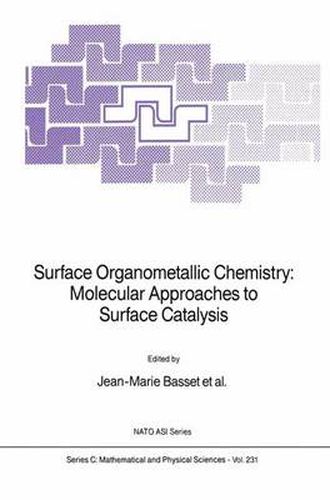Readings Newsletter
Become a Readings Member to make your shopping experience even easier.
Sign in or sign up for free!
You’re not far away from qualifying for FREE standard shipping within Australia
You’ve qualified for FREE standard shipping within Australia
The cart is loading…






This title is printed to order. This book may have been self-published. If so, we cannot guarantee the quality of the content. In the main most books will have gone through the editing process however some may not. We therefore suggest that you be aware of this before ordering this book. If in doubt check either the author or publisher’s details as we are unable to accept any returns unless they are faulty. Please contact us if you have any questions.
Surface organometallic chemistry is a new field bringing together researchers from organometallic, inorganic, and surface chemistry and catalysis. Topics ranging from reaction mechanisms to catalyst preparation are considered from a molecular basis, according to which the active site on a catalyst surface has a supra-molecular character. This. the first book on the subject, is the outcome of a NATO Workshop held in Le Rouret. France, in May. 1986. It is our hope that the following chapters and the concluding summary of recommendations for research may help to provide a definition of surface organometallic chemistry. Besides catalysis. the central theme of the Workshop, four main topics are considered: 1) Reactions of organometallics with surfaces of metal oxides, metals. and zeolites; 2) Molecular models of surfaces, metal oxides, and metals; 3) Molecular approaches to the mechanisms of surface reactions; 4) Synthesis and modification of zeolites and related microporous solids. Most surface organometallic chemistry has been carried out on amorphous high-surf ace-area metal oxides such as silica. alumina. magnesia, and titania. The first chapter. contributed by KNOZINGER. gives a short summary of the structure and reactivity of metal oxide surfaces. Most of our understanding of these surfaces is based on acid base and redox chemistry; this chemistry has developed from X-ray and spectroscopic data, and much has been inferred from the structures and reactivities of adsorbed organic probe molecules. There are major opportunities for extending this understanding by use of well-defined (single crystal) oxide surfaces and organometallic probe molecules.
$9.00 standard shipping within Australia
FREE standard shipping within Australia for orders over $100.00
Express & International shipping calculated at checkout
This title is printed to order. This book may have been self-published. If so, we cannot guarantee the quality of the content. In the main most books will have gone through the editing process however some may not. We therefore suggest that you be aware of this before ordering this book. If in doubt check either the author or publisher’s details as we are unable to accept any returns unless they are faulty. Please contact us if you have any questions.
Surface organometallic chemistry is a new field bringing together researchers from organometallic, inorganic, and surface chemistry and catalysis. Topics ranging from reaction mechanisms to catalyst preparation are considered from a molecular basis, according to which the active site on a catalyst surface has a supra-molecular character. This. the first book on the subject, is the outcome of a NATO Workshop held in Le Rouret. France, in May. 1986. It is our hope that the following chapters and the concluding summary of recommendations for research may help to provide a definition of surface organometallic chemistry. Besides catalysis. the central theme of the Workshop, four main topics are considered: 1) Reactions of organometallics with surfaces of metal oxides, metals. and zeolites; 2) Molecular models of surfaces, metal oxides, and metals; 3) Molecular approaches to the mechanisms of surface reactions; 4) Synthesis and modification of zeolites and related microporous solids. Most surface organometallic chemistry has been carried out on amorphous high-surf ace-area metal oxides such as silica. alumina. magnesia, and titania. The first chapter. contributed by KNOZINGER. gives a short summary of the structure and reactivity of metal oxide surfaces. Most of our understanding of these surfaces is based on acid base and redox chemistry; this chemistry has developed from X-ray and spectroscopic data, and much has been inferred from the structures and reactivities of adsorbed organic probe molecules. There are major opportunities for extending this understanding by use of well-defined (single crystal) oxide surfaces and organometallic probe molecules.